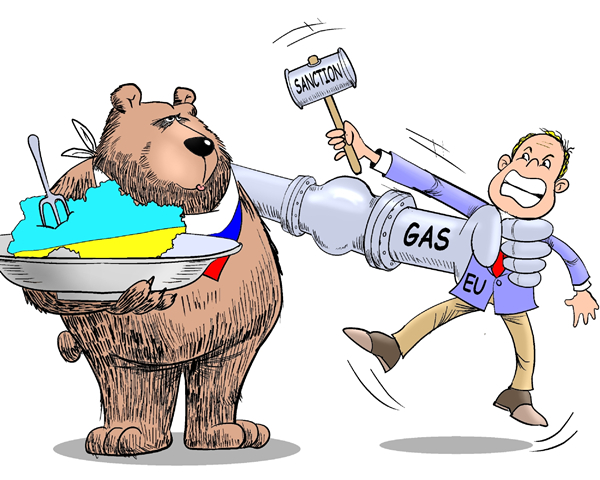The West provoked the Ukraine crisis
- By Zhao Jinglun
 0 Comment(s)
0 Comment(s) Print
Print E-mail China.org.cn, September 16, 2014
E-mail China.org.cn, September 16, 2014
The Western media are blaming Russia for "aggression" in Ukraine. That is standing the facts on their heads. It was NATO's relentless eastward expansion right up to Russia's borders and its engineering of the coup in Kiev that subverted the democratically elected government and replaced it with a pro-Western one that forced Russia to fight back.
|
|
|
A tit-for-tat action [By Jiao Haiyang/China.org.cn] |
Back in 2008, Russia warned that former Soviet republics Georgia and Ukraine occupied a vital security zone that Russia would not allow to be breached. NATO did not take the warning seriously. The result was war between Russia and Georgia and it ended in the de facto independence of South Ossetia and Abkhazia, sponsored by Russia.
Ukraine is even more important to Russia, not only as a buffer. It is where the Russian state and the Orthodox Church originated. Western efforts to move it out of Russia's orbit and integrate it into the West are like "digging up the Russians' ancestral grave" as the Chinese put it.
It is especially unfortunate that the United States and EU are slapping another -- the fourth -- round of sanctions on Russia just as Kiev and the secessionists in the east have reached a fragile cease-fire. Are they trying to fan the war flames?
According to Stephen Cohen, Professor Emeritus at New York University and Princeton University, there were three possible outcomes to the Ukraine crisis:
1. An escalating civil war that would draw in Russian and possibly NATO forces. This worst case scenario could resemble the Cuban missile crisis. That does not seem likely. NATO is not ready to fight an all-out war with Russia.
2. De facto partitioning with western Ukraine allied with the West and its eastern region with Russia.
3. A decentralized Ukraine, unaffiliated with any military alliances, with its territorial integrity guaranteed by the United States, Russia and the EU.
The third outcome seems most sensible, fair and just. It would have been the preferred outcome for the late eminent diplomat George Kennan, who in 1996 warned that NATO expansion into former Soviet territory would be a "strategic blunder of potentially epic proportions."
In calling for restraint and dialogue, British historian Robert Skidelsky argues that the goal of Western policy should be to find the means to work with Russia to stop Ukraine from being torn apart. But that is something the U.S. hand-picked interim prime minister Arseniy Yatsenyuk will absolutely not do. Instead he is openly pushing NATO to immediately admit Ukraine as a member and join the war on Russia as he declares Ukraine is "in a state of war" with Russia, despite the ceasefire. He is toeing the West's toughest line.
Will the fragile ceasefire hold? "Yats" alone will probably not be able to ignite a big war. Neither side seems to want one. The most sensible thing to do is for them to sit down and talk.
The author is a columnist with China.org.cn. For more information please visit: http://www.china.org.cn/opinion/zhaojinglun.htm
Opinion articles reflect the views of their authors, not necessarily those of China.org.cn.







Go to Forum >>0 Comment(s)